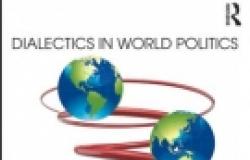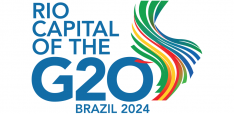Book Review: Dialectics in World Politics

Dialectics in World Politics edited by Shannon Brincat. Abingdon and New York: Routledge 2015. 216 pp, £95 hardcover 978-0-415-62527-2
This edited book provides an illuminating account both of what dialectics is and of how it can be applied to various aspects of world politics. The early parts of the book, particularly the first three chapters and Chapter 5, give an insightful explanation of the key points of what dialectics is and is not – including both methodology and ontology. The later chapters, Chapters 4, 6, 7, 8, and 9, show how dialectical methodology can be applied to respectively a critique of Israeli religious radicalism; the politics of Frantz Fanon; a critique of the state-centric Westphalian view of world history; twentieth-century debates about global security, and a discussion of long-term trends in global political economy
Each of the authors makes use of the dialectical model in a slightly different way and demonstrates how fruitful an approach it can be for revealing and critiquing power structures and for pointing the way towards progressive solutions to deep challenges and injustices in global politics. However, despite the plurality of approaches, there is nevertheless a unity: in almost all of the chapters, Marx or one of the post-Marxist thinkers is seen as embodying the best form of dialectics.
Overall, Dialectics in World Politics presents a convincing argument as to why a dialectical approach should be seen as superior to non-dialectical approaches. Shannon Brincat’s opening chapter puts forward the view that dialectics is a way of thinking that emphasises development, movement and change, but also understands things in their relation and interconnectivity with all other things. In the contradictory tensions within things, there is the potential for change. Dialectics approaches the world as an interconnected, contradictory, and dynamic whole (ontology), and as a way that we can understand the contradictory nature of the world (epistemology). The Dialectical Materialist interpretation of Marx is rejected as deterministic, teleological and positivistic, with Lukacs, Gramsci, Horkheimer and Adorno seen as rescuing dialectical thinking from this reductionism. The essence of dialectics, Brincat argues, is critical and revolutionary, as it reveals the contradictions behind dominant ways of thinking – ideological, scientific, metaphysical, or commonsensical. (p.9) The dialectical approach, then, differs from and overcomes dominant forms of thought such as the ideology of neoliberalism, and its ‘twisted logic of separation’, which separates and compartmentalises thought (p.16).
The essence of dialectics, Brincat argues, is critical and revolutionary, as it reveals the contradictions behind dominant ways of thinking – ideological, scientific, metaphysical, or commonsensical. (p.9) The dialectical approach, then, differs from and overcomes dominant forms of thought such as the ideology of neoliberalism, and its ‘twisted logic of separation’, which separates and compartmentalises thought (p.16).
Teschke and Cemgil put forward a similar argument in Chapter 2, in the context of debates in International Relations in the past few decades. Like Brincat, they see the value of dialectics in the fact that it emphasises the dynamic character of social reality, where critique is directed towards shaping this reality. History is seen as an open-ended and contested process, and deterministic interpretations of Marxism are rejected. Chapter 5 compares Hegelian dialectics with Daoism. But despite the similarities between the two, it seems that Daoism puts more emphasis on harmony and complementarity, while in dialectics contradiction should be interpreted as a generative mechanism: there is an inter-subjective process of contestation and struggle in social life, where antagonisms and contradictions may or may not be overcome.
However, it is Chapter 3 that provides perhaps the most interesting discussion in the book – where dialectics is contrasted with complexity thinking. Cudworth and Hobden’s chapter raises some potential problems with dialectics: that it can be teleological, that there may be an over-reliance on contradiction, and that dialectics are anthropocentric. Although both dialectics and complexity thinking take a holistic approach and emphasise the importance of change, for complexity thinking, developments within systems are seen as non-linear and not exhibiting regular patterns. Also through the process of ‘emergence’, new and unexpected phenomena become apparent, which cannot be deduced from an examination of the preceding constituent parts and are more than a sum of the parts. For example, consciousness is seen as an emergent feature of the brain. (p.53)
Cudworth and Hobden point out that complexity thinking puts more emphasis (than dialectics) on mutuality and co-evolution. Also for complexity thinking, totality extends beyond the human and social world to non-human systems, including climatic systems. While dialectics can be seen as teleological, anthropocentric and too tied to humanism, the future seems more open for complexity thinking. However, an engagement with complexity thinking could help to take dialectics in a non-teleological and non-anthropocentric direction. Cudworth and Hobden’s chapter provides an impressive discussion about the strengths and weaknesses of dialectical thinking, and it is a slight disappointment that these observations are not taken up as much as they could be in some of the other chapters in the book.
The later chapters of the book show how a dialectical approach and methodology can shed light on issues in world politics and history. However, while three of these chapters (4, 8, and 9) seem to simply apply a dialectical methodology to political problems, Chapters 6 and 7 provide an explanation of how dialectics is intrinsically related to a certain kind of politics – namely postcolonialism and anti-imperialism. In Chapters 6 and 7, the dialectical methodology used is integrally related to the content discussed: it is shown that a politics of anti-imperialism necessitates a dialectical approach.
Chapters 4, 8 and 9 do, however, make good use of dialectical thinking. In Chapter 4, Levine makes use of Adorno’s idea of negative dialectics to critique Israeli religious radicalism and the tendency to view Israel in messianic terms. Adorno is seen as negating ‘all transcendent, meta-historical, or providential narratives’ (p.70) and affirming a polyvocal pluralist view, which resists reductive knowledge and reductive synthesis. Biersteker, in Chapter 8, applies a dialectical approach to debates about global security in the twentieth century. According to Biersteker, ‘The conditions for the emergence of an alternative political security order at a particular time and place is dialectical in the sense that it is partially a product of the limitations, critiques, deficiencies, and contradictions contained or immanent within existing dominant world order conceptions themselves.’ (p.161) The dialectical approach, in his view, means emphasising the importance of holistic analysis and the importance of contradictions and historical change, while also being open-ended in suggesting future directions. Similarly, Patomaki’s interesting Chapter 9 uses a dialectical approach to trace the major changes in the global political economy from the nineteenth century to the present, where dialectics is understood as a plural and not a unitary phenomenon.
Unlike these chapters however, which seem to merely make use of dialectics, Chapter 6 and Chapter 7 demonstrate a much closer and more intimate connection between dialectics and the politics that they argue for. In Chapter 6, Agathangelou discusses Fanon’s critique of Hegel’s dialectic, because of its lack of universality and its exclusion of the black and colonised subject. Europe produces difference between body and mind, with itself as advanced mind and others as primitive flesh. For Fanon, violence and revolutionary antagonism ruptures the teleological dialectical progression of history that supports colonialism. In Agathangelou’s view, Fanon’s project is to ‘stretch the dialectic to understand colonial violence’ (p.112) and to expose the Western and European ‘fantasy of ontological difference’ (p.118). An anti-imperialist politics, then, must rethink dialectics and move beyond Hegel’s dialectics, which is seen as a logic of domination that undermines plurality.
Doyle, in Chapter 7, outlines a model of analysis referred to as inter-imperial political economy and culture (IIPEC), which challenges the Westphalian Eurocentric narrative that the genesis of the modern state is wholly Anglo-European and that nation-states are the only modern states, and considers ‘dialectical co-formation as a first principle in its analysis’. (p.126) Dialectical processes, however, are interpreted as not necessarily merely dyadic but as part of a ‘manifold differentiating expanse’ of the world. (p.127) Doyle argues that the historical dialectics of world politics shows itself to be an ‘inter-imperial co-production of state, economic, technical, and intellectual systems’ (p.134). But there is a ‘double movement’ of the dialectic. There is also a ‘microphysics’ of dissenting bodies within the macrophysics of state formation and historical change, which challenge the states that generated them and enable us to look afresh at the Westphalian framework, and further the process of deimperialization.
Beyond this book, there is need for a lot more discussion on the strengths and weaknesses of dialectics, and to what extent and in exactly what way dialectics need to be interpreted and modified. However overall, Dialectics in World Politics provides an impressive illustration of how dialectics is not only a useful methodology for explaining global politics, but also of how dialectics can be seen in some cases as essential to the formulation of a politics that challenges oppression and hegemonic power structures.
Dr. Richard Murphy teaches politics and philosophy at Durham University. His research interests are in idealism, critical theory, and postcolonial theory.


